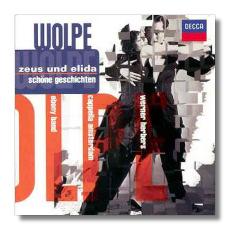
The Internet's Premier Classical Music Source
Related Links
- Latest Reviews
- More Reviews
-
By Composer
-
Collections
DVD & Blu-ray
Books
Concert Reviews
Articles/Interviews
Software
Audio
Search Amazon
Recommended Links
Site News
 CD Review
CD Review
Stefan Wolpe

- Zeus und Elida, Op. 5a (Grotesque Music for Soloists, Speaker, Chorus and Orchestra) 1
- Schöne Geschichten, Op. 5b 2
- Blues – Stimmen aus dem Massengrab – Marsch 3
1 Michael Kraus, Franziska Hirzel, Hans Aschenbach (Announcer), Soloists
2 Romain BISchof, Hans Aschenbach, Harry van der Kamp, Soloists; Daniel Reuss (Speaker)
3 Ebony Band & Cappella Amsterdam/Werner Herbers (Daniel Reuss, chorus master)
Decca (Entartete Musik Series) 460001-2 DDD 58:00
Wolpe's short opera Zeus und Elida is written in a quaint, bygone style. One must understand a little of the composer's background to get a handle on his style here. Wolpe, a Jew living in Germany in the 1920s, like Krenek and Weill, among others, was in the vanguard of progressive art in his day. When the Nazis came to power, he fled and lived for a time in Palestine. Eventually he settled in New York and taught music, numbering among his students Elmer Bernstein, Morton Feldman and Ralph Shapey. He also continued to compose, though he never fulfilled the potential he seemed to offer in 1928, when he wrote the works on this disc. Wolpe died in 1972.
Zeus und Elida contains music that shows the influence of 1920s Germany, with its Cabaret-jazz elements, its surreal settings, and, most of all, the twelve-tone world of Schoenberg. Wolpe fashions his opera – lasting about a half-hour and set in contemporary Berlin – using the story of Zeus whom suddenly appears amid the traffic and neon signs and hubbub. The people immediately greet him as a fool. Eventually Zeus, seeking his "Europa", falls in love with Charlotte, a prostitute, whom he thinks is the woman whose image he saw in a billboard advertisement for Elida perfume. He is put on trial for various "immoral" things and hauled off at the end of the opera at the behest of the all-powerful public prosecutor.
The music is a most curious blend of early jazz, serial techniques, and a kind of Ivesian sassiness. No, nothing here sounds actually like Ives, but the spirit of that composer's music comes to mind in more than a few places. In the end, the mixture is one that won't appeal to everyone. I found it a most skillfully-crafted work, full of little subtleties, brash colors, and outrageous humor. To get an idea of what the music sounds like, imagine a collaboration between Weill (of the 1920s), Schoenberg, and Krenek (in his Jonny spielt auf style). Still, this description is inadequate because Wolpe fashioned his own quite distinctive style, wherein, at least in this short opera, popular dances (tango, foxtrot, and others), jazz and jazzy instrumentation (the saxophone here sounds both alluring and sassy), and dissonance in the form of serial music, forge a sound that will recall forgotten fashions that ironically both date the music and immortalize it.
The singers are quite convincing, fully up to their demanding roles. Kraus as Zeus, and Hirzel as Elida/Charlotte are particularly fine, even though their roles hardly give them the chance to sing anything to fully showcase their voices. Their dramatic abilities never seem to fail them. Part of the credit for that, however, may go to conductor Werner Herbers, who seems to have the full measure of this score. His Ebony players and Cappella Amsterdam singers also turn in fine work.
The other major composition here, Schöne Geschichten (Pretty Stories), was originally staged using scenic projections, a fashion in the 1920s. Also composed in 1928, it is scored for an eight-piece jazz ensemble, but is less accessible than Zeus. There is a less noticeable jazz presence here, and less color in both the music and in the scoring. Again, the work is well-crafted and, though it sounds less dated, it also comes across as a tad pretentious.
The stories that Wolpe set to music are often comical, but at least offer some irony. Their titles are Science, Religion, Right, Culture, Love, Philosophy and Patriotism. The singers are fine here, as well.
In the brief trilogy, Blues – Stimmen aus dem Massengrab – Marsch, the idiom turns decidedly toward jazz. This music will have the widest appeal of anything here, though it lacks the artistic depth of its companion pieces. Blues and Marsch are strictly instrumental, while the central piece is written in a sort of Sprechstimme -style for chorus. Performances by the Ebony band under Herbers' baton are excellent.
Decca must be congratulated for making this music available. This release comes as part of its ongoing Entartete Musik series and all works are presumably première recordings. The notes are enlightening and the sound vivid.
Copyright © 2000, Robert Cummings


















